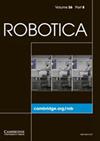Trajectory tracking control of a mobile robot using fuzzy logic controller with optimal parameters
IF 2.7
4区 计算机科学
Q3 ROBOTICS
引用次数: 0
Abstract
This work investigates the use of a fuzzy logic controller (FLC) for two-wheeled differential drive mobile robot trajectory tracking control. Due to the inherent complexity associated with tuning the membership functions of an FLC, this work employs a particle swarm optimization algorithm to optimize the parameters of these functions. In order to automate and reduce the number of rule bases, the genetic algorithm is also employed for this study. The effectiveness of the proposed approach is validated through MATLAB simulations involving diverse path tracking scenarios. The performance of the FLC is compared against established controllers, including minimum norm solution, closed-loop inverse kinematics, and Jacobian transpose-based controllers. The results demonstrate that the FLC offers accurate trajectory tracking with reduced root mean square error and controller effort. An experimental, hardware-based investigation is also performed for further verification of the proposed system. In addition, the simulation is conducted for various paths in the presence of noise in order to assess the proposed controller’s robustness. The proposed method is resilient against noise and disturbances, according to the simulation outcomes.使用具有最佳参数的模糊逻辑控制器对移动机器人进行轨迹跟踪控制
这项研究探讨了如何将模糊逻辑控制器(FLC)用于两轮差动驱动移动机器人的轨迹跟踪控制。由于调整 FLC 成员函数的固有复杂性,本研究采用了粒子群优化算法来优化这些函数的参数。为了实现自动化并减少规则库的数量,本研究还采用了遗传算法。通过 MATLAB 仿真验证了所提方法的有效性,仿真涉及多种路径跟踪场景。FLC 的性能与现有控制器进行了比较,包括最小规范解法、闭环逆运动学和基于雅各布转置的控制器。结果表明,FLC 可以提供精确的轨迹跟踪,同时减少均方根误差和控制器的工作量。为了进一步验证所提出的系统,还进行了基于硬件的实验研究。此外,还对存在噪声的各种路径进行了仿真,以评估所提出的控制器的鲁棒性。根据仿真结果,所提出的方法对噪声和干扰具有很强的抵抗力。
本文章由计算机程序翻译,如有差异,请以英文原文为准。
求助全文
约1分钟内获得全文
求助全文
来源期刊

Robotica
工程技术-机器人学
CiteScore
4.50
自引率
22.20%
发文量
181
审稿时长
9.9 months
期刊介绍:
Robotica is a forum for the multidisciplinary subject of robotics and encourages developments, applications and research in this important field of automation and robotics with regard to industry, health, education and economic and social aspects of relevance. Coverage includes activities in hostile environments, applications in the service and manufacturing industries, biological robotics, dynamics and kinematics involved in robot design and uses, on-line robots, robot task planning, rehabilitation robotics, sensory perception, software in the widest sense, particularly in respect of programming languages and links with CAD/CAM systems, telerobotics and various other areas. In addition, interest is focused on various Artificial Intelligence topics of theoretical and practical interest.
 求助内容:
求助内容: 应助结果提醒方式:
应助结果提醒方式:


